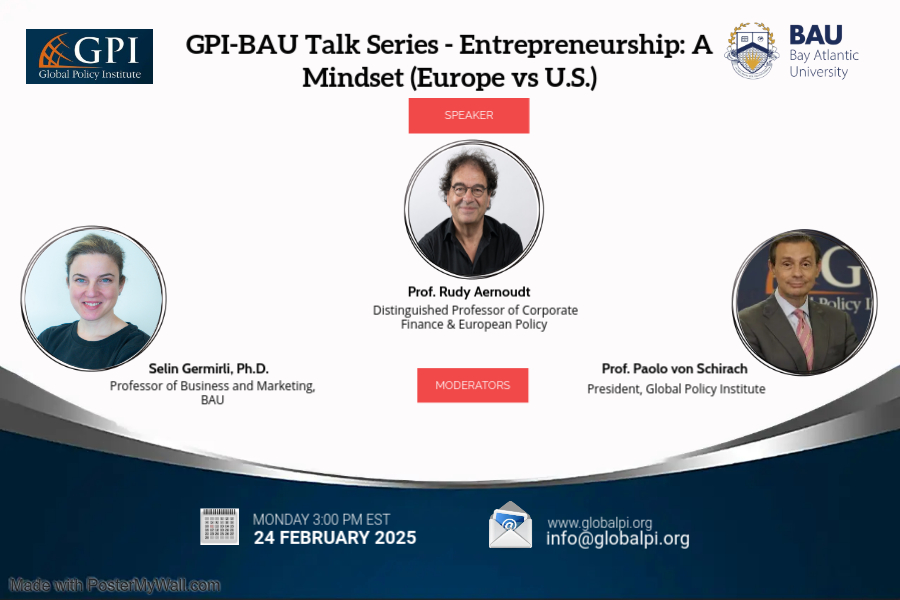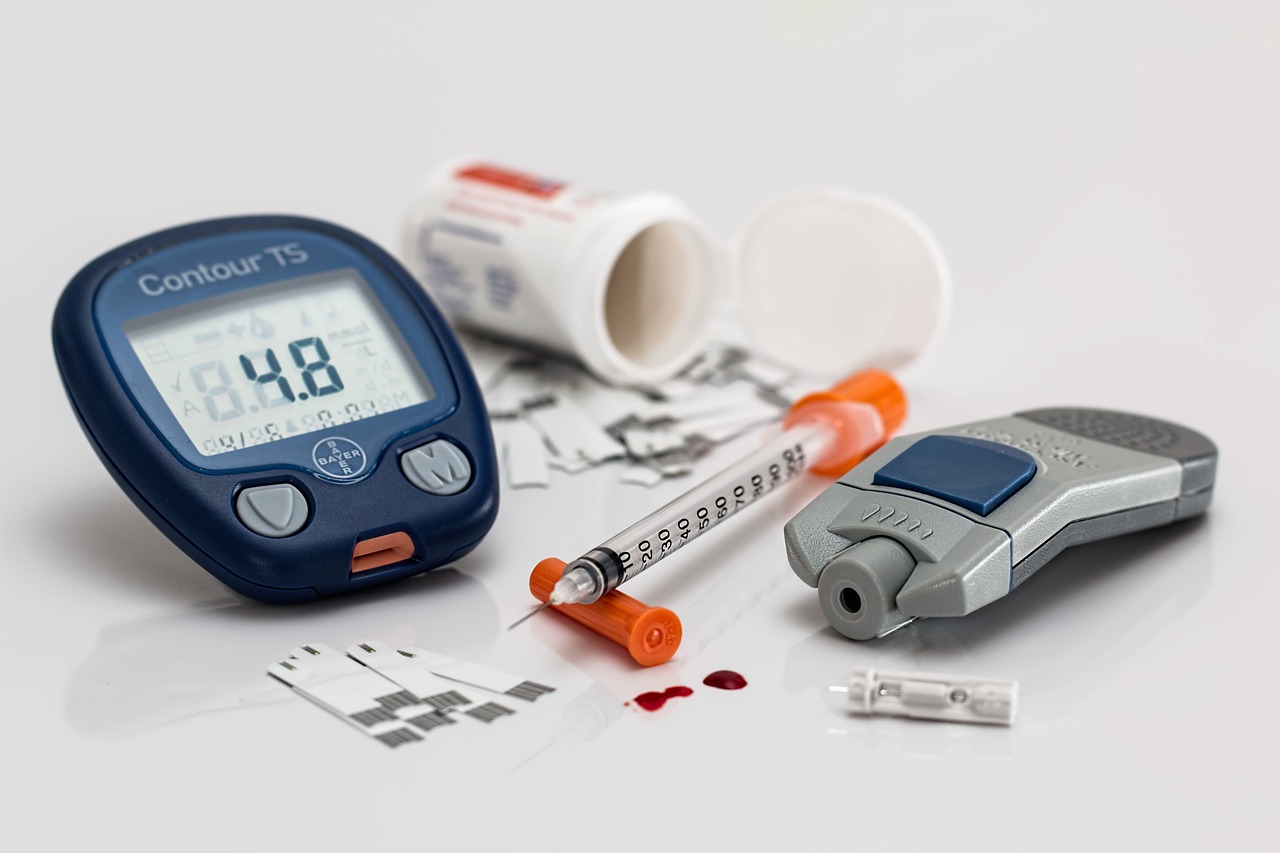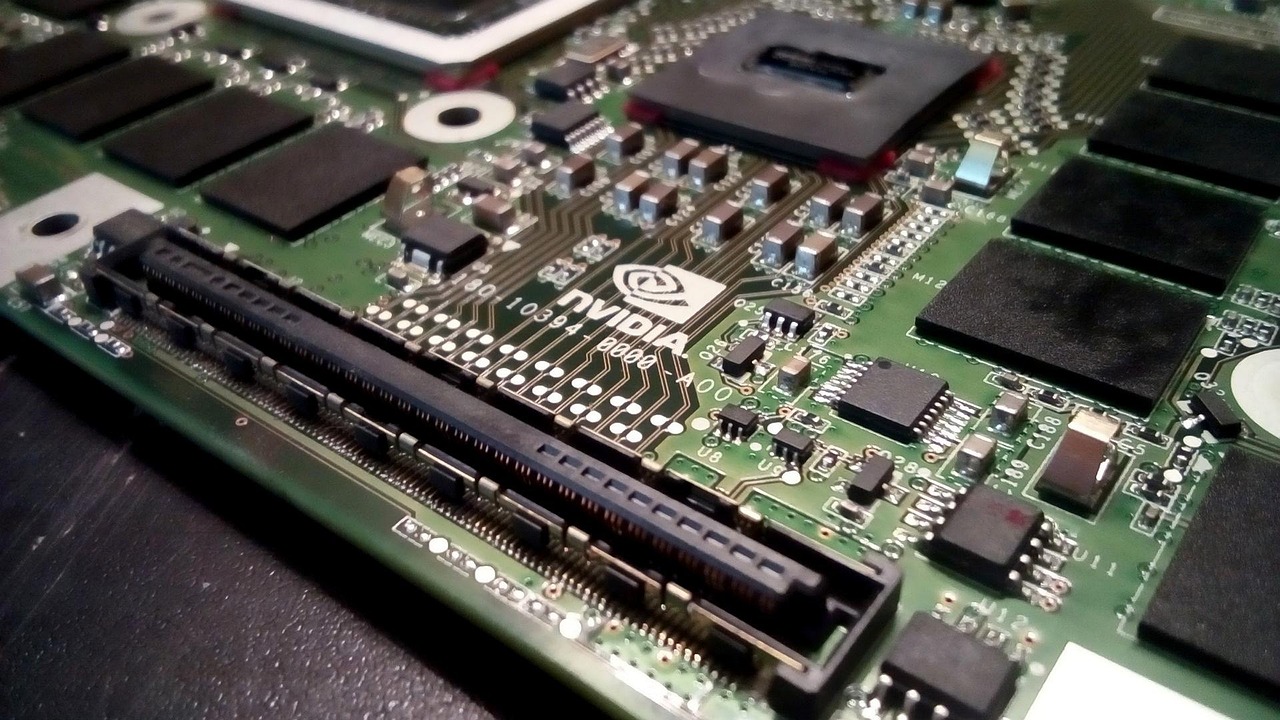-
GPI-BAU Talk Series – Entrepreneurship: A Mindset (Europe vs. U.S.)
On Monday, February 24, 2025, at 3:00 PM (EST) the Global Policy Institute (GPI) and Bay Atlantic University (BAU) will hold a talk titled "Entrepreneurship: A Mindset (Europe vs. U.S.)" via Zoom and in-person at BAU. The focus will be on examining whether entrepreneurship is a bottleneck in Europe, rather than geopolitics, and exploring how the US and EU differ in their approaches. How to be a Successful Entrepreneur Capitalism is an economic system that succeeds when risk takers are able and free to engage in an economic activity that will lead to material gains. We call these risk takers “entrepreneurs.” Successful entrepreneurs are at the core of growing economies. They are individuals willing to take chances on new business ideas that may fail. But how does one become a good entrepreneur? Is it all about skills learnt in school, or about having the right mental attitude? Or perhaps about both? And what about the impact of the economic ecosystem? For sure, laws, regulations, permits, and credit availability affect the ability to create and then grow a new business. Many issues, many questions. Please join us for a timely conversation with Professor Rudy Aernoudt, a major expert in this field and author of “Entrepreneurship, a Mindset.”
Read More and Register -
The Rising Tide of Extremism: Why Central Asian Youth Are Drawn to Terrorist Groups- An Inside Mind Theory
By Dr. Nishakant Ojha - February 19, 2025 - In recent years, the increasing attraction of Central Asian youth to extremist and Takfiri groups has become a major security concern for regional governments and international security experts. The ongoing Russia-Ukraine conflict has further exacerbated these concerns, with reports of young migrant workers being recruited for extremist activities, mirroring past recruitment patterns observed during the conflicts in Syria and Iraq. Notably, the emergence of the Turan Battalion, a group composed of Turkic-speaking Central Asians fighting alongside Ukrainian forces against Russia, underscores the urgency of addressing radicalization among youth. Additionally, extremist propaganda spread by leaders like Idas Sadeghov has contributed to the rising tide of radicalism. This article explores the underlying causes of this phenomenon, the role of external influences, and the measures being taken by governments to curb this threat, based on insights from experts across Kyrgyzstan, Kazakhstan, Tajikistan, and Uzbekistan.
Read More -
Affordable Supersonic Travel is Coming Soon
By Paolo von Schirach - February 17, 2025 - Boom Achieves Supersonic Flight. The first civil supersonic jet made in America breaks the sound barrier in historic Mojave airspace.” Here is a simple statement on the website of Boom, a relatively small American company, based in Denver, Colorado and Greensboro, North Carolina. Boom was created with the goal of building Overture, a supersonic passenger aircraft that will make business sense for passengers and for the airlines that will buy it and operate it. Imagine this: for the price of a business class ticket, you will be able to fly from Paris to Boston in half the time. For sure, supersonic flight is not news. American companies have been making state of the art supersonic airplanes for decades. But those are military jets, built on government contracts for the U.S. Air Force. Until now, no U.S. corporation seriously tried to manufacture a passenger jet that would travel at supersonic speed. The problem was and is the exorbitant operating costs of supersonic airplanes that would make it impossible for any airline to make money flying them.
Read More -
The Arab Superpower Emerges: Redefining Global Power Dynamics – A Point-Blank Analysis
By Prof. (Dr.) Nishakant Ojha - February 14, 2025 - At the Verge of a New Beginning A new geopolitical force is emerging—an independent Arab bloc wielding economic strength, military self-reliance, and diplomatic influence. No longer just an energy supplier or regional player, the Arab world is evolving into a strategic powerhouse, shaping global policies, alliances, and technological progress. Historically, the Arab world aligned with either Western powers or Eastern blocs like BRICS. However, the dynamics are shifting. As Arab nations reduce their dependence on the West and diversify alliances, they are positioning themselves as a third power, independent of the U.S.-led order and the China-Russia axis. This transformation is driven by economic diversification, military modernization, and shifting energy policies. U.S. foreign policy under Donald Trump has inadvertently pushed the Arab world towards self-reliance, while Russia and China must now adapt to a more independent Arab bloc.
Read More -
Trump is Serious about Change in the Ukraine War (From the FOX News Rundown)
By Rebecca L. Grant, Ph.D. - February 11, 2025 - Oil prices, Ukraine in NATO, the decimation of the Russian military and what about a meeting between President Donald J. Trump and Russian President Vladimir Putin? FOX News Radio White House Correspondent Jared Halpern and I talked it all over on the FOX News Rundown, Full clip here, beginning at 12:08 and catch these edited highlights below. First Halpern played some of Trump’s recent remarks: “President Zelensky would like to have peace, he’s told me that very strongly,” Trump said and “OPEC ought to get on the ball and drop the price of oil and that war will stop right away.” Then came my turn to react. “Trump is serious about change in the Ukraine war,” I said. “Biden’s policy was, as long as it takes. Trump’s policy is ‘end this war now.’ The thing he’s finding is that there are certain conditions he needs to set to make that happen. The number one condition, already done, is to continue military aid to Ukraine. Next is his second move, and that is to tell Russia that they are going to have to face some consequences, if Putin won’t come to the bargaining table. That of course is the big issue: Putin has not been ready to negotiate.
Read More -
Type 2 Diabetes in the U.S.: Very Costly, Preventable, and Reversible
By Paolo von Schirach - February 05, 2025 - In 2021–2023, 40.3% of adults in the U.S. had obesity. The primary causes are bad diet and lack of exercise. Too many ultra processed foods, and a sedentary lifestyle. One of the main consequences of obesity is type 2 diabetes. It costs almost $ 20,000 a year to treat a type 2 diabetes patient in America. In 2022 the total estimated cost of diagnosed type 2 diabetes in the U.S. was $412.9 billion, including $306.6 billion in direct medical costs and $106.3 billion in indirect costs attributable to diabetes. These expenditures and others (also related to treating chronic conditions) help explain the massive health care spending in the U.S. that has now reached almost 18% of GDP, much more than the 10% average among developed countries. Sugary beverages are part of the problem In most cases type 2 diabetes is about bad diet and lack of exercise. Already years ago, a study by the Atlanta based Centers for Disease Control, (CDC), documented that overconsumption of sugary sodas is a big component of this bad diet. On average, a can of soda contains the equivalent of 10 to 12 teaspoons of sugar. Too much sugar ingested regularly is essentially like absorbing daily a low-level poison.
Read More -
Why Donald Trump Must Protect S-Band Radar Spectrum for U.S. Defense (From 1945)
By Rebecca L. Grant, Ph.D. - February 03, 2025 - Donald Trump Must Guard Spectrum for Radars to Defend the USA: No, the U.S. military cannot share a critical piece of S-band radar spectrum with commercial 5G wireless providers. Not if the new Trump administration wants to improve defenses against mystery drones and guard against threats of missiles from China and Russia. “President Trump has talked about an Iron Dome for America,” incoming National Security Mike Waltz told CBS News, referring to Israel’s missile defense system. “That needs to include drones as well, not just adversarial actions like hypersonic missiles,” Waltz said. The priority is clear. However, if the new Trump administration is serious about missile defense for the United States, or any improvements at all, the new team will have to engage on the priority of keeping S-band spectrum clear for military radars that track those missiles and drones. The U.S. military relies on a slew of S-band radars to carry out critical missile tracking. During the Biden years, an idea took shape that the military might be able to share the S-band spectrum with commercial 5G wireless companies in order to meet growing consumer demand.
Read More -
How AI Is Revolutionizing Cancer Care
By Janice Tagoe, MBA, MSc. - January 31, 2025 - AI is set to transform the way we approach cancer care. During the January 21, 2025 announcement of the $500 billion “Stargate” AI infrastructure project at the White House, Oracle Chairman Larry Ellison highlighted AI’s immense potential in healthcare, specifically in cancer detection and treatment. Ellison painted a future where AI could detect cancer through a simple blood test and create personalized cancer vaccines in just 48 hours. “This is the promise of AI and the promise of the future,” he remarked. These advancements are no longer confined to imagination. Researchers and institutions around the world are making tremendous progress in applying AI to cancer treatment and research, and the results are already changing lives. A New Era in Early Detection and Personalized Treatment Indeed, AI is becoming an indispensable tool in the fight against cancer, especially in early detection and tailored treatments. At Harvard Medical School researchers have created an advanced AI tool that diagnoses cancer, recommends customized therapies, and predicts patient survival across various cancer types. Similarly, Stanford Medicine has launched an AI-powered system that analyzes medical images and clinical data to predict cancer prognosis and guide treatment more effectively.
Read More -
Trump’s Blueprint for Iran, Plus Gaza, the Houthis, Saudi Arabia and AI: Quick Takes from The Brian Kilmeade Show (FOX News Radio)
By Rebecca L. Grant, Ph.D. - January 29, 2025 - Host Brian Kilmeade and I discussed the Gaza hostage deal, the heavy U.S. military pressure on Iran including rotation of five separate aircraft carriers, the defense of Israel with U.S. Navy destroyers, Saudi Arabia’s plans for investment in AI, and the status of Iran’s nuclear enrichment. The interview wrapped up with a discussion of the number one geo-strategic problem left by Biden: the Russia-China alliance, with North Korea and Iran tacked on. Highlights from the Jan. 15 interview follow or listen here. On the Gaza hostage deal, Kilmeade pointed out: Abu Sinwar was in prison for 20 years. He ends up heading up the biggest death and destruction to Israel in modern times. I’m worried about the thousands of prisoners about to be released. Are you?
Read More -
NVIDIA’s Project Digits Brings AI Supercomputing to Everyone’s Desk
By Janice Tagoe, MBA, MSc. - January 27, 2025 - NVIDIA’s groundbreaking innovation, Project Digits, is making waves in the tech industry. This personal AI supercomputer promises to bring high-performance AI computing to everyone, from seasoned professionals to curious students. With cutting-edge features and an accessible price point, it is poised to reshape the future of data analytics and AI development. The desktop revolution At the core of Project Digits lies NVIDIA's GB10 Grace Blackwell Superchip, offering up to one petaflop of AI performance at FP4 precision. Historically, this level of power was reserved for massive data centers, but NVIDIA has packaged it into a compact desktop unit. This allows researchers and professionals to train and deploy advanced AI models right from their desks, eliminating the need for external servers.
Read More















